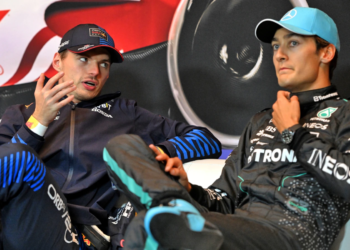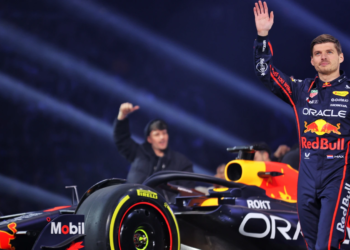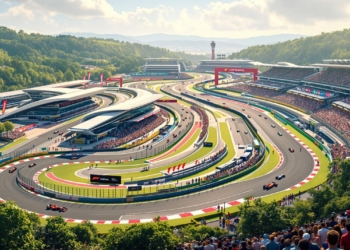CEO of the soon-to-be-renamed AlphaTauri Formula 1 team Peter Bayer has explained why the squad is shying away from placing rookies in its race seats for 2024 and beyond.
The team’s inception under the Red Bull banner came in 2006, with the buyout of Minardi and the resultant birth of the side that ran under the Toro Rosso moniker.
The Faenza’s camp remit was to be an F1 proving ground for Red Bull Academy drivers graduating from junior formula with an eye on preparing them for a Red Bull Racing seat.
However, Bayer along with Team Principal Laurent Mekkies is overseeing a new approach to the team’s driver line-up, with experienced F1 veteran Daniel Ricciardo partnered with Yuki Tsunoda for the 2024 season.
“Our shareholders said, you know, ‘we want you to continue and educate young drivers, but we also want you to be successful,’” said Bayer. “I think, ultimately, you can’t have both.”
Bayer described Ricciardo and Tsunoda as a pairing that “make the right team,” citing the former as “offering a lot of expertise, especially when it comes down to the set-up of the car” and suggesting that the latter is “coming to the pinnacle of his performance curve.”
The AlphaTauri CEO also attested that having the experience of five-time GP starter Liam Lawson in reserve is “to keep the fire warm under their seats and to make sure that we progress as a team.”

The 2024 line-up signifies a redefined approach to driver selection at the Red Bull junior squad and the big step-up required of F1 rookies has had a significant part to play in that.
Williams for instance afforded rookie Logan Sargeant a full race calendar in 2023 to acclimatise given the steepness of F1’s learning curve and the Grove-based outfit is looking to reap the benefits this year.
Bayer is in agreement with former Team Principal Franz Tost that rookies require a multi-year approach.
“Franz always says, and honestly in the meantime I agree 100%, that a young driver needs three years to be sort of ready for F1,” added Bayer (via Autosport).
“With all the complexity the sport is currently requiring, and the amount of information they have to digest and process and then feed back to us, so that we again understand as a team what to do, how to change the settings and so on, and to be competitive, simply they need a lot of time.”
Bayer has stated that the team will invest that time away from racing and instead focus on a testing programme to prepare up-and-coming drivers which will be more beneficial than ever as the ground effect 2022 cars will now be permitted for test and development talent for the first time in 2024.
“We want to take some of the money we’re making currently to make sure we can prepare the young drivers in the best possible way,” he said.
“And I think Oscar Piastri is the best example. He ran I don’t know how many hundreds or thousands of miles with Alpine, but he came in and he understood the car.
“He understood the dynamics, he understood the switches, and it makes such a big difference, and so it connects you fully.
“And we have a big programme actually for Liam and Isack Hadjar and potentially Ayumu Iwasa, and we want to make sure that we run them as much as possible also.
“It’s interesting that the previous car is a ’22 car, so it’s finally a relevant car.”
The approach of preparing young drivers in testing and having experienced drivers racing will hopefully lead to better results for AlphaTauri, which is the opinion held by Bayer and the team.
“I think the reality today is if you’re looking at the grid, it’s so competitive, it’s so tight, that every 10th of a second is being fought for by our colleagues here, and we came to the conclusion that in order to be contenders for the top midfield, we need one experienced driver but we’ll continue to grow young talent that ultimately shall end up in Red Bull Racing.”









